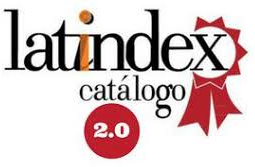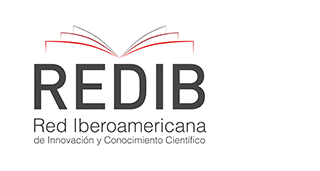Desarrollo local sustentable. Gobernanza, cultura, resiliencia y oportunidades. / Sustainable local development. Governance, culture, resilience and opportunities.
DOI:
https://doi.org/10.37767/2468-9785(2020)001Palabras clave:
Desarrollo sustentable, Cultura, Gobernanza, Institucionalidad, Ventanas de oportunidades, Sustainable development, Culture, Governance, Institutionality, Windows opportunitiesResumen
El artículo reflexiona sobre diferentes postulados interdisciplinarios del desarrollo territorial sumergiéndose en lo cultural, la sustentabilidad local y su introspección teórica hacia una institucionalidad y gobernanza multifacética, que establezca estrategias para generar ventanas de oportunidades para una resiliencia socio-eco-sustentable duradera.
ABSTRACT:
The article reflects on different interdisciplinary postulates of territorial development immersed in the cultural, local sustainability and theoretical introspection towards a multifaceted institutionality and governance, which establishes strategies to generate windows-opportunity for a sustainable social-ecological resilience.
Referencias
Arslan, M. and Alqatan, A. (2020). Role of institutions in shaping corporate governance system: evidence from emerging economy. Heliyon, 6, e03520.
Auty, R. (1993). Sustaining Development in Mineral Economies. The Resource Curse The- sis. Ed. Routledge. London.
Baena Paz, G. (2008). Metodología de la investigación. Grupo Editorial Patria. México.
Barkhordari, S.; Fattahi, M. and Ali Azimi, N. (2018). The Impact of Knowledge-Based Economy on Growth Performance: Eviden- ce from MENA Countries. Journal of the Knowledge Economy. Vol. 37, pp. 1–15.
Bas, T. and Oliu, C. (2018). Innovation strategy management survey of the Chilean biomedical industry. Assessment of windows of opportunities to reduce technological gaps. The International Journal of Health Planning and Management 33 (2), e512-e530
Bebbington, J.; Russell, S. and Thomson, I. (2017). Accounting and sustainable development: Reflections and propositions. Critical Perspectives on Accounting 48, 21–34
Bringezu, S., Potocˇnik, J., Schandl, H., Lu, Y., Ramaswami, A., Swilling, M. and Suh, S. (2016). Multi-Scale Governance of Sustaina- ble Natural Resource Use—Challenges and Opportunities for Monitoring and Institutional Development at the National and Global Level. Sustainability, vol. 8, pp. 778-803.
Broman, G. and Robert, K-H. (2017). A framework for strategic sustainable development. Journal of Cleaner Production, 147, 17-31.
Brundiers, K. and Eakin, H. (2018). Leveraging Post-Disaster Windows of Opportunities for Change towards Sustainability: A Framework. Sustainability, 10, 1390.
Carson, R. (1962). Silent Spring, Fortieth Anniversary Edition, Houghton Mifflin, Boston.
Carpenter S., Walker B., Anderies J. And Abel N. (2001). From metaphor to measurement: Resilience of what to what? Ecosystems, 4: 765-781
Cherrington, E., Griffin, R., Anderson, E., Hernandez Sandoval, B., Flores-Anderson, A., Muench, R. Markert, K., Adams, E., Lima-ye, A. and Irwin, D. (2020). Use of public Ear-th observation data for tracking progress in sustainable management of coastal forest ecosystems in Belize, Central America. Re-mote Sensing of Environment, 245, 111798.
Cohen, W. and Levinthal, D. (1990). Absorptive Capacity: A New Perspective on Learning and Innovation. Administrative Science Quarterly 35:128-152
Cronkleton, P., Pulhin, J. and Saigal, S. (2012). Comanagement in Community Forestry: How the Partial Devolution of Management Rights Creates Challenges for Forest Communities. Conservation and Society, 10(2): 91-102.
Dedeurwaerdere T. (2005). From Bioprospecting to Reflexive Governance. In Ecological Economics, 53 (4), 473-491.
Des Vries, B. and Petersen, A. (2009). Conceptualizing sustainable development: An assessment methodology connecting values, knowledge, worldviews and scenarios. Ecological Economics, 68 (4), 1006-1019.
Dries L.T. Hegger, Hens A.C. Runhaar, Frank Van Laerhoven, Peter P.J. Driessen. (2020). Towards explanations for stability and change in modes of environmental governance: A systematic approach with illustrations from the Netherlands. Earth System Governance, 3, 100048.
Feindt, P. and Weiland, S. (2018). Reflexive governance: exploring the concept and assessing its critical potential for sustainable development. Introduction to the special issue. Journal of Environmental, Policy & Planning, 20 (6), 661-674.
Frankel, J. (2012). The Natural Resource Curse: A Survey of Diagnoses and Some Prescriptions. HKS Faculty Research Working Paper Series RWP12-014, John F. Kennedy School of Government, Harvard University.
Gustafsson, K. and Lidskog, R. (2018). Boundary organizations and environmental governance: Performance, institutional design, and conceptual development. Climate Risk Management, vol 19, pp. 1-11.
Hakkak, M. Y. Zarnegarian, and H. Zarei. (2013). Identifying The Relationship Between Organizational Culture and Knowledge Management. Glob. J. od Sci. Eng. Technol., No. 11, 19-28.
Hall, R. Ashford, A. 2011. Primer on the Emergence and Evolution of Sustainable Development (1951 to 2012) A Companion to Ashford, N. A. and Hall, R. P. (2011) Technology, Globalization, and Sustainable Development: Transforming the Industrial State New Haven, Yale University Press.
Hawkins, Ch. and Wang, X. (2012). Sustainable Development Governance: Citizen Participation and Support Networks in Local Sustainability Initiatives. Public Works Management Policy, vol. 17: 1, pp. 7-19.
Henckel, T. and McKibbin, W. (2017). The economics of infrastructure in a globalized world: Issues, lessons and future challenges. Journal of Infrastructure, Policy and Development, 1:2, 1-18.
Hodgson, G. (2011). ¿Qué son las instituciones? CS, 8, 17-53.
Hoppe, E. and Schmitz, P. (2013). Do Sellers Offer Menus of Contracts to Separate Buyer Types? An Experimental Test of Adverse Selection
Theory (June 2013). CEPR Discussion Paper No. DP9510, Available at SSRN: https://ssrn.com/abstract=2282964
Joa, B. and Schraml, U. (2020). Conservation practiced by private forest owners in Southwest Germany – The role of values, perceptions and local forest knowledge. Forest Policy and Economics, 115, June 2020, 102141.
Joa, B., Winkel, J. and Primmer, E. (2018). The unknown known – A review of local ecological knowledge in relation to forest biodiversity conservation. Land Use Policy, 79, 520-530.
Johnston, P., Everard, M., Santillo, D. and Robèrt, K-H. (2007). Reclaiming the Definition of Sustainability. Environmental Science and Pollution Research, 14 (1) 60 – 66.
Jovanea, F., Seligerb, G. and Stock, T. (2018). Competitive Sustainable Globalization General Considerations and Perspectives. Procedia Manufacturing, 8, 1-19.
Keun, L., Juma, C. and Mathews, J. (2014). Innovation Capabilities for Sustainable Development in Africa. WIDER Working Paper 2014/062. World Institute for Development Economics Research wider.unu.edu.
Kjellén, B. (2007). A New Diplomacy for Sustainable Development: The Challenge of Global Change. Routledge, Oxford, United Kingdom.
Kjellén, B. (1999). Multilateral Diplomacy and Science, the Columbia University Earth Institute: Earth Matters, Winter 1999/2000, http://www.clgd.org/modules.php?op=modload&name=News&file=article&sid=8.
Li, Z., Folmer, H., & Xue, J. (2014). To what extent does air pollution afect happiness? The case of the Jinchuan mining area, China. Ecological Economics, 99(4), 88–99.
Lihtonen, V. (1959). Metsätalouden suunnittelu ja järjestely [Planning and Organizing Forestry]. WSOY, Porvoo.
Meadows, D., Randers, J and Meadows, D. (2006). Limits to Growth. The 30-Year Update. Earthscan, UK. Reprinted in 2006. Original 1972.
Missimer, M., Robèrt, K.-H., and Broman, G. (2016a.) A strategic approach to social sustainability– part 1: exploring the social system. Journal of Cleaner Production. Advance online publication available at http://www.sciencedirect.com/science/article/pii/S0959652616302645.
Moradi, R. Saba, S., Azimi, and R. and Emami. (2012). The Relationship between Organizational Culture and Knowledge Management. Int. J. Innov. Ideas, 12, 30–46.
Opoku A. (2015). The Role of Culture in a Sustainable Built Environment. In: Chiarini A. (eds) Sustainable Operations Management. Measuring Operations Performance. Springer, Cham.
Paavola, J. (2007). Institutions and environmental governance: A reconceptualization. Ecological Economics, 63, 93-103.
Peterson, N. (2016). Introduction to the special issue on social sustainability: integration, context, and governance, Sustainability: Science, Practice and Policy, 12:1, 3-7, DOI: 10.1080/15487733.2016.11908148
Rytteri, T.; Peltola, T.; Leskinen, L. (2016). Co-production of forestry science and society: Evolving interpretations of economic sustainability in Finnish forestry textbooks. Journal of Forest Economics 24, 21–36.
Sachs, J. and Warner, A. (1995). Natural Resource.
Sachs, J. and Warner, A. (2001). Natural Resources and Economic Development: The Curse of Natural Resources. European Economic Review, 45, 827-838.
Seraji, R. S. Majid, A. Shoar, and A. Abasi. (2013). Study of the relationship between knowledge management and organizational culture Case study: agriculture organizationof Qom, 4:6, 1535–1542.
Sharp, E., Daley, D. Lynch, M. (2011). Understanding Local Adoption and Implementation of Climate Change Mitigation Policy. Urban Affairs Review, 47:3, 433-457.
Söderbaum, P. (2011). Sustainability economics as a contested concept. Ecol. Econ. 70,
–1020.
Stojanović, I., Ateljević, J. and Stević, R. (2016). Good Governance as a Tool of Sustainable Development. European Journal of Sustainable Development, 5, 4, 558-573.
Toma, S-G. (2019). Learning From the Asian Tigers: Lessons In Economic Growth. Annals - Economy Series, Constantin Brancusi University, Faculty of Economics, 3, 63-69, June.
Vahabi, M. (2017). A critical survey of the resource curse literature through the appropriability lens. Document de travail du CEPN N°2017- 14. Centre d’économie del’Université Paris Nord. CNRS UMR n° 7234.
Voß, J. and Bornemann, B. (2011). The politics of reflexive governance: challenges for designing adaptive management and transition management. Ecology and Society 16(2): 9.
Voss, J-P. and Kemp, R. (2005). Reflexive governance for sustainable development-incorporating feedback in social problem solving. Paper presented at the ESEE (European Society for Ecological Economics) conference. Lisbon, Portugal.
Weltin, M., Zasada, I., Plogmann, J-M., Trau, F-N. and Piorr, A. (2018). Data on the scope of the literature on sustainable intensification 1997–2016: Bibliography, geography and practical approaches. Data in Brief, 19, 1658-1660.
Weltin, M., Zasada, I., Piorr, A., Debolini, M., Geniaux, G., Perez, O., Scherer, L., Marco, L. and Schulp, C. (2018). Conceptualising fields of action for sustainable intensification – A systematic literature review and application to regional case studies.
Westerman, K., Oleson, K. and Harri, A. (2012). Building Socio-ecological Resilience to Climate Change through Community-Based Coastal Conservation and Development: Experiences in Southern Madagascar.










